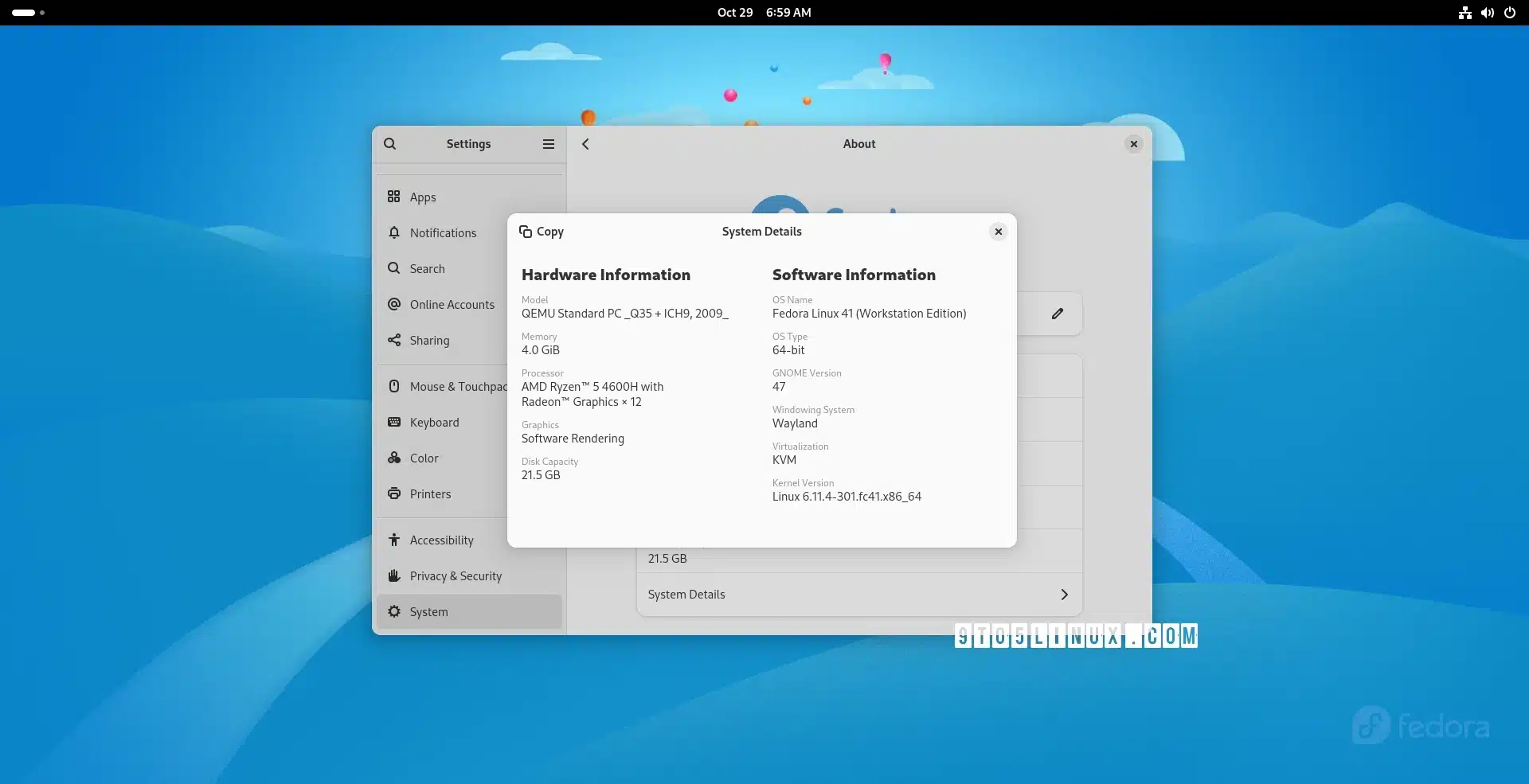If you experience any difficulty in accessing content on our website, please contact us at 1-866-333-8917 or email us at support@chicagovps.net and we will make every effort to assist you.

Today, the Fedora Project formally announced the release of Fedora Linux 41, the newest edition of their GNU/Linux distribution supported by Red Hat, showcasing some of the most cutting-edge software available.
Built on Linux kernel 6.11, Fedora Linux 41 features the latest GNOME 47 desktop environment within the flagship Fedora Workstation edition, which has removed the X11 session to provide a Wayland-only experience for its users. Moreover, Fedora Workstation now allows the installation of NVIDIA drivers with Secure Boot enabled via GNOME Software.
“In the past, the Nvidia driver installation was taken out of GNOME Software due to its lack of support for Secure Boot, which is increasingly set as default on laptops. This update reinstates the option for Fedora Workstation users who have Secure Boot enabled, which is great for those interested in using Fedora Linux for gaming and CUDA. Additionally, this modification helps maintain Fedora’s relevance for AI/LLVM workloads,” shared the Fedora Project.
The other flavors of Fedora Linux 41 come with the latest KDE Plasma 6.2 desktop environment on the Fedora KDE Spin, Xfce 4.18 on the Fedora Xfce Spin, LXQt 2.0 on the Fedora LXQt Spin, Cinnamon 6.2.9 on the Fedora Cinnamon Spin, MATE 1.28.2 on the Fedora MATE/Compiz Spin, and Budgie 10.9.2 on the Fedora Budgie Spin.
Fedora Linux 41 introduces an exciting new version known as Fedora MiracleWM, which features the innovative Miracle-WM, a tiling window manager built on the Mir compositor library. The Fedora MiracleWM Spin provides a premium Wayland experience that supports a range of platforms, including both low-end ARM and x86 devices. Here’s your initial glimpse!
Additionally, another new Fedora Spin is launched in this release, specifically designed for phones, tablets, and 2-in-1 laptops, featuring the KDE Plasma Mobile. Other notable features in Fedora Linux 41 include support for MIPI cameras in newer laptops, along with PipeWire camera support in the Mozilla Firefox web browser.
Fedora Linux 41 marks a significant milestone as it adopts DNF5, bringing a swifter and more robust package management experience. With DNF5, users can enjoy a comprehensive package manager that no longer relies on Python, resulting in a smaller installation footprint, increased speed across various tasks, a streamlined set of software management tools, improved download metadata optimization, and a consistent behavior across the software management framework.
This version also elevates the image-mode experience for Fedora users. It provides familiar DNF commands not only on the client side but also within container image builds thanks to DNF5 being integrated alongside rpm-ostree. Furthermore, it supports reproducible package builds and sets “tuned” as the default power profile management daemon for Fedora Workstation, KDE Plasma, and Budgie editions.
Additionally, Fedora Linux 41 introduces systemd service hardening for default system services, enhancing security. It speeds up the GnuTLS implementation with Kernel TLS (KTLS), introduces ROCm 6.2 support for AMD users, and activates bootupd for Fedora Atomic Desktops as well as Fedora IoT editions, the latter of which also includes composefs by default.
In this latest update, a new command line utility named fedora-repoquery has been introduced for conducting repoqueries across Fedora Linux, EPEL, eln, and CentOS Stream package repositories. Additionally, this release includes support for self-encrypting drives within the Fedora Installer, compatibility for Intel IPU6 cameras, and separates /usr/bin/dtrace from systemtap-sdt-devel (systemtap) into its own package to improve various buildroots.
Internally, Fedora Linux 41 features an updated default software selection, along with an enhanced GNU toolchain that comprises GCC 14, GNU Binutils 2.42, GNU C Library 2.40, and GDB 14. Moreover, it incorporates other technologies such as RPM 4.20, Python 3.13, Go 1.23, LLVM 19, Perl 5.40, and Node.js 22.
Fedora Linux 41 is currently available for download from the official website, supporting both 64-bit (amd64) and AArch64 (arm64) architectures. This release is primarily designed for fresh installations, although existing Fedora Linux 40 users can upgrade their systems using DNF system-upgrade or through GNOME Software on the Fedora Workstation edition.
Last updated 9 hours ago
ChicagoVPS is your gateway to unparalleled hosting solutions. Our state-of-the-art datacenters and powerful network ensures lightning-fast speeds and uninterrupted connectivity for your websites and applications. Whether you’re a startup looking for scalable resources or an enterprise in need of enterprise-grade hosting, our range of plans and customizable solutions guarantee a perfect fit. Trust in ChicagoVPS to deliver excellence, combining unmatched reliability and top-tier support.
For Inquiries or to receive a personalized quote, please reach out to us through our contact form here or email us at sales@chicagovps.net.
